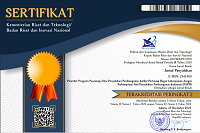Peran Penyuluhan Keluarga Berencana dalam Meningkatkan Pengetahuan KB pada Pasangan Usia Subur (PUS) Kelompok Masyarakat Miskin
Abstract
Family planning (KB) is an effective effort to control the population and at the same time improve a better life for the community, especially for poor families. The availability of information and extension services is important to increase the participation of fertile aged couples (PUS) in poor families in accessing family planning services. For this reason, this study aims to (1) describe the level of knowledge of PUS poor families on family planning information and counseling, and (2) to analyze the effect of extension agents on the level of knowledge of PUS about family planning. Data were collected through a survey method using questionnaire on 120 respondents representing PUS in poor families in Bogor Regency and Bogor City. Each district / city was selected the sub-district that had the highest number of poor PUS. The results showed that the level of knowledge about family planning with the poor in PUS was classified as low. The results of statistical tests show that extension services have an effect on the level of knowledge of the PUS about family planning.
Downloads
References
Apolonia, I. (2018). Gambaran Tingkat Pengetahuan Akseptor KB Hormonal tentang Efek Samping Kontrasepsi Hormonal di Puskesmas Gentungan Kabupaten Gowa Tahun 2018. 4(17), 48–58. https://jurnal.farmasisandikarsa.ac.id/ojs/index.php/JFS/article/view/24
Bappenas. (2010). Evaluasi Pelayanan Keluarga Berencana Bagi Masyarakat Miskin (Keluarga Prasejahtera/Kps Dan Keluarga Sejahtera–I/Ks–I. Bappenas.
BKKBN. (2019). Peraturan BKKBN RI No 5 Tahun 2019 tentang Pelaksanaan Pemberian Tunjangan Kinerja Pegawai di Lingkungan Badan Kependudukan dan Keluarga Berencana Nasional. https://jdih.bkkbn.go.id/public_assets/file/c2dfcb95fd30b26dd774d9e930644786.pdf
Blackstock, O. J., Mba-Jonas, A., & Sacajiu, G. M. (2010). Family planning knowledge: The role of social networks and primary care providers as information sources for African American women. American Journal of Sexuality Education, 5(2), 128–143. https://doi.org/10.1080/10627197.2010.491060
BPS. (2017). Data Pertumbuhan Penduduk di Indonesia. https://www.bps.go.id
Dinas Sosial. (2019). Sebaran Peserta PKH Kabupaten Bogor. https://pkh.dinsos.bogorkab.go.id/
Ellen. (2020). Slovin’s Formula Sampling Techniques.
Fitri, P., & Fitriyah, N. (2018). Gambaran karakteristik Akseptor Keluarga Berencana (KB) Metode Kontrasepsi Jangka Panjang (MKJP) di Desa payaman. Jurnal Biometrika Dan Kependudukan, 6(1). https://doi.org/https://doi.org/10.20473/jbk.v6i1.2017.70-78
Juma, P. A., Mutombo, N., & Mukiira, C. (2015). Women’s attitudes towards receiving family planning services from community health workers in rural Western Kenya. African Health Sciences, 15(1), 161–170. https://doi.org/10.4314/ahs.v15i1.22
Lou, C.-H., Wang, B., Shen, Y., & Gao, E.-S. (2004). Effects of a community-based sex education and reproductive health service program on contraceptive use of unmarried youths in Shanghai. Journal of Adolescent Health, 34(5), 433–440. https://doi.org/10.1016/j.jadohealth.2003.07.020
Medhanyie, A., Spigt, M., Kifle, Y., Schaay, N., Sanders, D., Blanco, R., Geertjan, D., & Berhane, Y. (2012). The role of health extension workers in improving utilization of maternal health services in rural areas in Ethiopia: A cross sectional study. BMC Health Services Research, 12(1). https://doi.org/10.1186/1472-6963-12-352
Mergia, M., Shegaze, M., Ayele, G., Andarge, E., Yeshitila, Y. G., Wassihun, B., Tunje, A., & Memiah, P. (2020). Mothers’ satisfaction with health extension services and the associated factors in Gamo Goffa zone, Southern Ethiopia. PLoS ONE, 15(5), 1–14. https://doi.org/10.1371/journal.pone.0232908
Muljono, P. (2012). Metode Penelitian Sosial. IPB PRESS.
Nurmahdalena, A., Display, D., Berencana, P. K., & Belakang, L. (2016). Dalam Pengendalian Pertumbuhan Penduduk. 4(4), 4869–4881.
Ruark, A., Kishoyian, J., & Bormet, M. (2019). Increasing Family Planning Access in Kenya Through Engagement of Faith-Based Health Facilities , Religious Leaders , and Community Health Volunteers. 7(3), 478–490.
Sihabudin, A., Dimyati, I., & Mujtaba, B. (2018). Adopsi Inovasi Program Keluarga Berencana oleh Akseptor dari Komunitas Adat Terpencil Baduy di Kecamatan Leuwidamar Kabupaten Lebak. 14(1), 175–188. https://journal.ipb.ac.id/index.php/jupe/article/view/15620/14517
Singarimbun, M., & Effendi, S. (2011). Metode Penelitian Survey. PT Pustaka LP3S.
Sungailiat, D. K., & Djuria, R. F. (2016). Pengetahuan Wanita Usia Produktif Tentang Kontrasepsi Women Productive Age Knowledge About Contraception In Sungailiat District. 1–10.
Suwardono, B. P., Fatah, M. Z., & Farid, N. N. (2020). Description of the Low Participation of Family Planning Acceptor in Bangkalan Regency. Jurnal PROMKES, 8(1), 121. https://doi.org/10.20473/jpk.v8.i1.2020.121-131
Utami, F. P., Matahari, R., & Sugiharti, S. (2020). Populasi Akses Pasangan Usia Subur ( PUS ) Miskin terhadap Informasi Keluarga Berencana ( KB ) di Kota Yogyakarta Abstrak Poor Couples of Childbearing Age Access to Family Planning Information in Yogyakarta City Abstract. 28, 63–77.
Authors who publish with this journal agree to the following terms:
- Authors retain copyright and grant the journal right of first publication with the work simultaneously licensed under a

This work is licensed under a Creative Commons Attribution 4.0 International License that allows others to share the work with an acknowledgement of the work's authorship and initial publication in this journal. - Authors are able to enter into separate, additional contractual arrangements for the non-exclusive distribution of the journal's published version of the work (e.g., post it to an institutional repository or publish it in a book), with an acknowledgement of its initial publication in this journal.
- Authors are permitted and encouraged to post their work online (e.g., in institutional repositories or on their website) prior to and during the submission process, as it can lead to productive exchanges, as well as earlier and greater citation of published work (See The Effect of Open Access).















